At Large In Ballard: The Experiment
A letter from the experiment. This experiment may have provided answers but not necessarily to the questions UW said they were seeking
Wed, 10/26/2016
By Peggy Sturdivant
I was upset when I thought it was just happening in Ballard. When I learned it was citywide I was incensed. Who was placing letters addressed to the “American Neo-Nazi Party” throughout Seattle neighborhoods?
I learned about these “found letters” when my letter carrier was visibly upset after finding a letter addressed to the “American Neo-Nazi Party” c/o a P.O. Box seemingly left for her to find on her route. A day earlier her substitute had found one and without looking at the address stuck it in a friend’s outgoing mail because he wasn’t going back to the station. That didn’t end well.
The letter carriers in Ballard felt targeted. It was the week that bombs had exploded in New York and New Jersey. The envelopes were found near mailboxes, propped against a rock or a fence and were addressed and had a stamp. My letter carrier described them as “creepy.”
Then another envelope turned up, addressed to the same P.O. Box but to “Black Lives Matter.” This one had a return address and it was a simple Google search from a photo of the envelope in situ to connect the envelopes to a graduate student.
Who would pretend to drop letters addressed to “American Neo-Nazi Party” or “Black Lives Matter?” Answer: the University of Washington’s Sociology Department conducting an experiment in which everyone in Seattle was unknowingly a subject. Except citizens weren’t supposed to know they were part of an experiment and I wasn’t supposed to write about it. And the study team at UW didn’t think consider that anyone would know there was more than one dropped envelope or an apparent choice between an activist movement promoting social and racial justice and a known racist, totalitarian party.
These were details I learned over the next few days starting with a voicemail from UW Sociology Professor Ross Matsueda about 20 minutes after I emailed the graduate student. Professor Matsueda and I spoke at length. He even thanked me for my interest in the study. He gave me background on the “lost letter” experiment pioneered by Stanley Milgram in 1965 and said it was designed to measure altruism. I asked several times about the use of the “American Neo-Nazi Party” versus “Black Lives Matter.” He said they had gone back and forth on it, wanting to replicate the organization Milgram used in his study plus add a contemporary group.
When I told him that letter carriers were feeling targeted and “creeped out” he said, “That’s unfortunate.”
At the end of our conversation he asked me not to write about the letters until field collection was over because it would compromise the study. I was at a loss. Their experiment struck me as a possible hate crime. I called a neighbor and former op-ed writer for the Seattle Post-Intelligencer, now author and editor at Crosscut.com for advice.
This began a three-week odyssey that grew to involve Crosscut’s managing editor and Norman G. Arkans, AssociateVice-President, Media Relations and Communications at the University of Washington. The professor asked that all of our conversations be considered retroactively off the record and Crosscut’s managing editor informed him that wasn’t possible as I’d identified myself as a writer. The professor he’d thought I just wanted to write my neighbors to assuage their concerns. The Communications Director asked me not to write about the experiment because people weren’t supposed to know where the letters came from and compromising data collection could also endanger National Science Foundation funding. I responded that in that case the graduate student shouldn’t have put his name on the return address. I was never able to learn if that was an oversight, if not, was it only on the “Black Lives Matter” or an envelope with a neutral personal address?
Professor Matsueda didn’t feel that using the two addressees implied they were equating the two groups. His study just wanted to replicate Milgram’s in 1965, supposedly in the interest of learning which neighborhoods are safer based on whether someone would mail a stranger’s dropped letter. Since no one else was supposed to know about the different addressees it was a non-issue for them, or at most, “interesting.”
In the end, after lots of back and forth an article ran in Crosscut, an edited version of my fourth draft. If others shared my outrage I didn’t hear it. Discordant national discourse seemed to drown out what I found personally appalling.
This experiment may have provided answers but not necessarily to the questions UW said they were seeking. Perhaps it wasn’t an act of altruism to mail letters to the “American Neo-Nazi Party” in Ballard; it was an act of decency to not pick them up. Hence the way they appeared to be left for letter carriers. UW said it could lead to information about which neighborhoods are safer. My question: safer from crime or the University of Washington’s Sociology Department?
For more information: http://crosscut.com/2016/10/uw-study-seems-to-equate-black-lives-matter…


